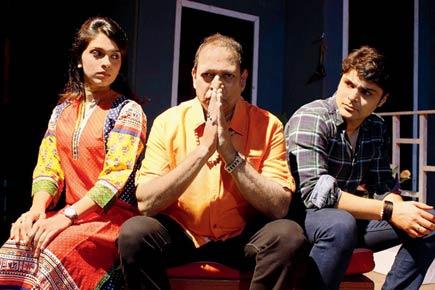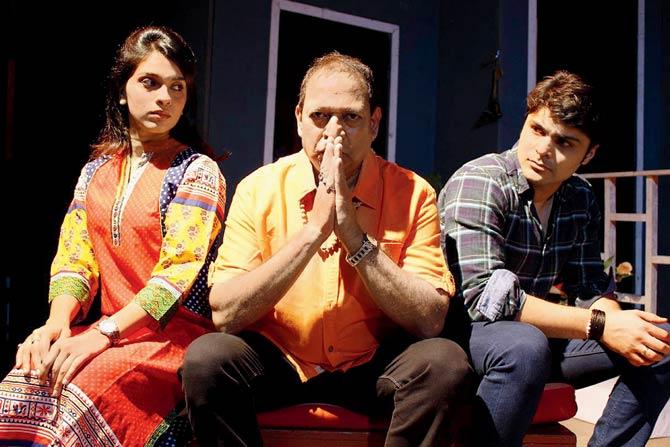Celebrating Hindi theatre groups that have survived against all odds to stage relevant, entertaining plays over the decades

 For a while now, the going has not been easy for Hindi theatre groups; lack of venues, fickle audience, runaway actors and the drying up of fresh writing plague many older groups.
For a while now, the going has not been easy for Hindi theatre groups; lack of venues, fickle audience, runaway actors and the drying up of fresh writing plague many older groups.
ADVERTISEMENT
Om Katare’s Yatri theatre group is currently celebrating its 37th anniversary with a festival of plays; for a Hindi group to survive that long against such odds is remarkable.
Yatri — like other Hindi groups, Ank and Ekjute — were born when Prithvi Theatre was built in the seventies (IPTA and Theatre Group were older). But over 35 years later, there is still no auditorium dedicated to Hindi plays, and Prithvi too has opened its doors for plays in other languages.

A still from Om Katare’s play Jeene Bhi Do Yaaro
There are many auditoriums in Mumbai, but they either give dates only to Marathi or Gujarati plays, or are beyond the budget of the Hindi theatre producer, or, so much in demand that the wait list for dates runs into several months, which makes it unviable to put up a big production and then keep it on hold till dates are obtained. The other thing is that the audience profile has slowly changed — they are younger now, and look for plays that speak to them, which means English plays.
Yatri was among the Hindi groups that tried to take their plays to other venues in the city — like Mysore Association — but failed to draw large enough audiences. Travelling to other cities, particularly in the North, helps keeps shows running.
Still, Katare’s perseverance has kept Yatri going strong for 37 years. The group’s first major production was the satire Ek Tha Gadha, and since then he has been working consistently on a variety of plays, serious, comic, family dramas and children’s plays that continue to appeal to a section of the audience that is not comfortable with abstract work.
This year Ank will complete 40 years, a milestone year for one of the foremost theatre groups in the city. Ank was established by Dinesh Thakur in 1976, and over the years has established a reputation for quality work. After the death of Thakur in 2012, his wife and lead actress, has been carrying on the legacy, doing many of Ank’s popular plays, as well as getting other directors like Ram Gopal Bajaj and Devendra Ankur to create new productions for Ank.
Except for a couple of silly comedies, which he admitted were aberrations, Thakur preferred to do plays that were socially relevant, and communalism was an issue that troubled him enough to do two very significant productions with communal amity as their theme—Asgar Wajahat’s Jis Lahore Nahin Dekhya and Rahi Masoom Reza’s Topi Shukla. The former still packs them in, the latter, unfortunately did not do as well. In Lahore, Preeta played the best role of her career — that of a seventy-year-old Hindu woman abandoned by her family in Pakistan during the Partition. The woman endears herself to the whole neighbourhood, even as communal forces try to stoke violence.
Ank also did a lot of Vijay Tendulkar’s plays in Hindi (excellent Vasant Deo translations)—right from Kamla, Jaat Ji Poochho Sadhu Ki, Khamosh Adalat Jaari Hai, to the little staged Anji. The playwright had graciously given credit to Ank for keeping his plays alive, if not in the original Marathi, then in Hindi. To Ank goes credit for Hai Mera Dil, the longest running Hindi play in India with over a thousand shows. The comedy about a hypochondriac who believes he is dying and wants to find a suitable groom for his wife, has had repeat audiences over the years and remains laugh-out-loud funny.
Preeta Mathur has managed to take Ank places, performing all over the country and also done plays like Kaamiya and Atke Bhatke Latke Sur, which give her challenging parts to play. She has plans to celebrate the 40th anniversary with new productions and revivals of some old hits.
The third major Hindi group that came up soon after Prithvi Theatre is Nadira Zaheer Babbar’s Ekjute, that completes 35 years in 2016, entirely due to the dedication of Nadira Zaheer Babbar and her team, that includes her supportive family. From classics like Lower Depth, to folk plays like Jasma Odhan, to reviving dying theatre forms — Parsi Theatre with Yahudi Ki Ladki, or Dastangoi with Hum Kahein Aap Sunein, Ekjute’s constant endeavour to experiment with form has been admirable. Babbar is also inclined towards socially relevant plays, and when she could not find suitable texts, she started writing her own plays like Sakhubai and Ji, Jaisi Aapki Marzi. If Ekjute has an occasional comedy, it has been a Dario Fo work, or an adaptation that does not cross the borders of good taste.
Some other groups that started then, fell by the wayside, many new ones were formed later and are carrying the torch of Hindi theatre… but how many will survive the decades without losing steam… or hope?
Deepa Gahlot is an award-winning film and theatre critic and an arts administrator. She tweets at @deepagahlot
 Subscribe today by clicking the link and stay updated with the latest news!" Click here!
Subscribe today by clicking the link and stay updated with the latest news!" Click here!






